Have you ever wondered if the full moon has a powerful influence on human behavior and health? Many people believe that the full moon can cause changes in emotions, provoke bizarre behavior, and even impact sleep and mental health. But is there any scientific evidence to support these claims?
In this article, I will unravel the truth behind the popular belief in the connection between the full moon and human well-being. We will delve into the world of lunar cycles, exploring the potential effects on sleep quality, mood, mental health, the cardiovascular system, violence, trauma, and even menstrual cycles. Together, let’s uncover the facts and separate myths from reality.
Key Takeaways:
- Scientific studies have found little evidence to support the belief that the full moon significantly affects human behavior and health.
- While some studies suggest a possible link between the full moon and sleep patterns, the overall impact is minimal and influenced by other factors.
- The full moon has no consistent association with changes in mood, mental health disorders, or cardiovascular conditions.
- The belief in increased violence, aggression, trauma, and suicide during the full moon is not supported by scientific evidence.
- The moon does not influence the onset of menstrual cycles, debunking the common belief.
If you’re seeking guidance and emotional support during crisis situations, explore the realm of Emergency Moon Reading for Crisis Support. Stay tuned to discover the truth behind the full moon’s influence on human well-being.
The Full Moon Effect
Throughout history, there has been a strong belief that the full moon can lead to behavioral changes and affect mental state. This belief can be traced back to ancient Greece and Rome and has been documented in the writings of classical authors. The word “lunatic” even stems from the idea that changes in mental state are related to lunar cycles. However, scientific studies have not found consistent evidence to support this belief. While some historic theories have been debunked, there is still interest in exploring the potential connections between lunar cycles and human behavior and health.
Research on the Full Moon Effect has yielded mixed results. Some studies have suggested a possible correlation between lunar cycles and certain behavioral changes, while others have found no significant association.
A study published in the Journal of Clinical Psychiatry examined the relationship between the full moon and mental health. The researchers analyzed data from psychiatric emergency room visits and found no consistent increase in admissions during the full moon phase. Another study conducted by researchers at the University of Gothenburg in Sweden analyzed data from more than 500,000 individuals and found no evidence of an increased risk of suicide during the full moon.
While these findings may seem to contradict the popular belief in the Lunar Lunacy phenomenon, it is important to recognize that human behavior and mental state are influenced by numerous factors, including social, cultural, and individual characteristics. The effects of the full moon, if any, may be subtle and vary from person to person.
As I delved deeper into the research, it became clear that the Full Moon Effect is still a subject of debate and exploration among scientists. Many studies have failed to uncover consistent evidence supporting the notion that the moon has a direct impact on human behavior and mental health.
Nonetheless, the fascination with the relationship between lunar cycles and human behavior continues to persist. The allure of the moon’s mystical influence on our lives remains a captivating topic, sparking curiosity and igniting discussions.
| Studies | Findings |
|---|---|
| Journal of Clinical Psychiatry | No consistent increase in psychiatric emergency room admissions during the full moon phase |
| University of Gothenburg study | No evidence of an increased risk of suicide during the full moon |
While the scientific community strives to unravel the mysteries of the Full Moon Effect, it is important to approach the topic with a critical mindset and consider the lack of consistent evidence thus far. As we continue to explore the complex relationship between lunar cycles and human behavior, it is crucial to prioritize empirical data and sound scientific methodology.
For more information on the potential effects of the full moon, you can visit Healthline’s comprehensive guide on the Full Moon Effect.
Full Moon and Sleep
When it comes to sleep, the topic of the full moon often sparks curiosity. People wonder if the lunar phase can impact their sleep quality, sleep latency, and even their REM sleep. While the scientific evidence is not definitive, some studies suggest that there may be a correlation between the full moon and sleep patterns.
Research has indicated that people may experience changes in their sleep before and during the full moon. One study found that individuals fell asleep later and had less overall sleep on the nights preceding the full moon. This phenomenon, known as sleep latency, suggests that it might take longer for individuals to fall asleep during this lunar phase.
Furthermore, the full moon has been associated with a decrease in deep sleep and an increase in REM latency. Deep sleep is an essential stage of sleep for physical restoration and recovery, while REM sleep is crucial for cognitive processes and emotional regulation. Disruptions in these sleep stages can potentially impact sleep quality and overall well-being.
However, it’s important to note that not all studies have consistently observed these associations between the full moon and changes in sleep patterns. Other factors such as sleep apnea, alcohol use, and medication can also influence sleep latency and quality, making it challenging to solely attribute any changes to the lunar phase.
To gain a better understanding of the relationship between the full moon and sleep, further research is needed. By investigating larger sample sizes and controlling for confounding factors, scientists can provide more conclusive evidence on how lunar cycles may or may not affect sleep.
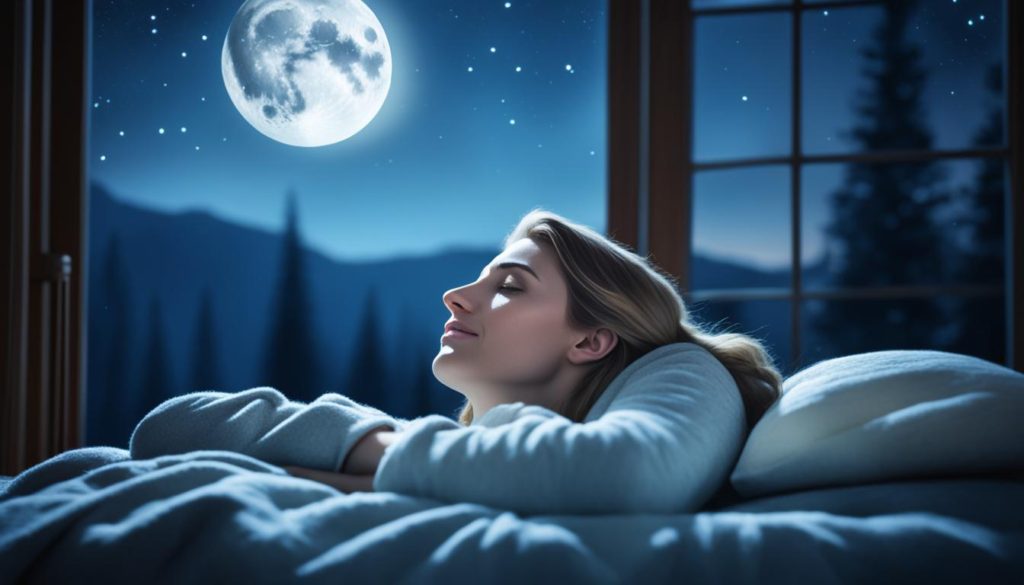
The Impact of the Full Moon on Sleep Patterns
Studies have found that sleep quality and sleep latency may be influenced by the full moon. Sleep latency refers to the time it takes for someone to fall asleep, and a longer latency period may indicate difficulty initiating sleep. Additionally, the full moon may be associated with less deep sleep and increased REM latency. Deep sleep is essential for physical restoration and recovery, while REM sleep plays a crucial role in cognitive processes and emotional regulation. Further research is necessary to fully understand and clarify the relationship between the full moon and sleep patterns.
| Full Moon and Sleep | Findings |
|---|---|
| Sleep Quality | Some studies suggest that sleep quality may be affected by the full moon. |
| Sleep Latency | Individuals may experience longer sleep latency, taking more time to fall asleep during the nights before the full moon. |
| REM Sleep | The full moon may be associated with increased REM latency, potentially disrupting the normal sleep pattern. |
While the scientific community continues to explore the possible connection between the full moon and sleep, it’s important to prioritize healthy sleep practices, such as maintaining a consistent sleep schedule, creating a conducive sleep environment, and practicing relaxation techniques. These habits can contribute to better sleep regardless of the lunar phase.
For more information on sleep and its relationship to the full moon, check out this Healthline article.
Full Moon, Mood, and Mental Health
The human body operates on a delicate balance, influenced by various internal and external factors. One crucial element that plays a role in our well-being is circadian rhythms. These natural cycles help regulate our sleep-wake patterns, body temperature, and hormone production. It is believed that disruptions in circadian rhythms can have an impact on our physical and mental health.
When it comes to the influence of the full moon on mood and mental health, there has been a long-standing belief that lunar cycles can affect our emotional state and trigger certain mental health disorders. However, scientific research suggests otherwise.
Studies analyzing extensive data sets, including emergency room records and medical records, have found no consistent relationship between lunar cycles and psychiatric conditions or the length of hospital stays. While the full moon may have a small impact on circadian rhythms, it does not significantly impact mood or mental health.
It’s important to rely on empirical evidence when evaluating claims related to the full moon and mental health. The notion that the full moon causes widespread mood disturbances or exacerbates mental health disorders lacks scientific support.
Studies analyzing emergency room records and medical records have found no consistent relationship between lunar cycles and psychiatric conditions or the length of hospital stays.
If you or someone you know is struggling with mood or mental health issues, it is crucial to seek professional help. They can provide the necessary guidance and support to manage mental health conditions effectively. While the full moon may not be a direct contributor to mood or mental health disorders, there are evidence-based approaches and therapies that can help improve overall well-being.
Remember, mental health is a complex and multifaceted issue that requires comprehensive care from qualified professionals. If you are experiencing mental health concerns, reach out to a mental health professional who can provide personalized support and guidance tailored to your specific needs.
For more information on mental health and the possible effects of the full moon, visit https://www.healthline.com/health/full-moon-effects.
Full Moon and Cardiovascular System
Research has examined the potential effects of the full moon on the cardiovascular system. Some studies have found interesting connections, while others have yielded conflicting results.
One study investigating the relationship between lunar phases and blood pressure uncovered intriguing findings. It revealed that blood pressure tends to drop during both the new moon and full moon phases.1
Another study focused on individuals with type 2 diabetes and explored the impact of lunar cycles on various cardiovascular factors. Surprisingly, the researchers found that the full moon did not influence blood pressure levels. However, it did affect other related functions, such as blood sugar levels and heart rate.2
Although conflicting research exists, some studies suggest no significant difference in athletic performance during different lunar phases. Therefore, the full moon may not have a direct influence on cardiovascular performance in this context.3
To fully comprehend the relationship between the full moon and the cardiovascular system, more extensive research is needed. Nevertheless, the existing studies provide valuable insights but also highlight the complexity of this subject.
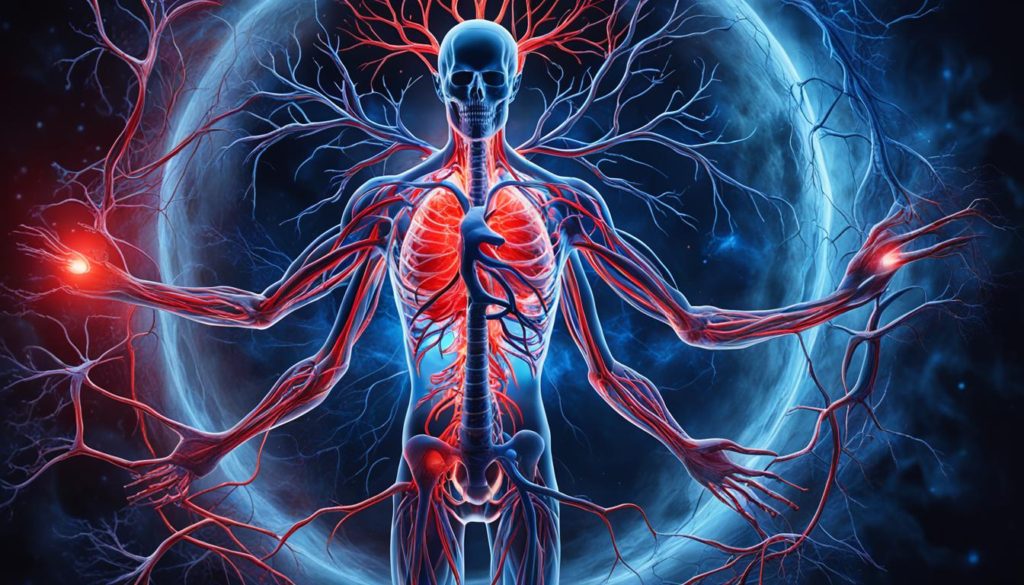
It is crucial to note that these studies represent a small portion of the available research on this topic, and further investigation is required to draw definitive conclusions. The cardiovascular system is intricate, and multiple factors contribute to its functioning. Factors such as diet, exercise, genetics, and overall health also play significant roles in cardiovascular health. Therefore, while lunar cycles may have certain effects on the cardiovascular system, they should not be regarded as the sole determinants of heart rate, blood pressure, or other cardiovascular factors.
| Research Findings | Reference |
|---|---|
| Blood pressure tends to drop during new moon and full moon phases | Study 11 |
| Full moon does not significantly influence blood pressure levels but impacts other related functions such as blood sugar levels and heart rate in individuals with type 2 diabetes | Study 22 |
| No significant difference in athletic performance observed during different lunar phases | Study 33 |
Overall, research exploring the connection between the full moon and the cardiovascular system provides interesting insights but does not offer definitive conclusions. The impact of lunar cycles on cardiovascular health is undoubtedly a captivating area that warrants further exploration.
As the medical field continues to advance, understanding the intricate relationship between the full moon and the cardiovascular system may provide valuable information for enhancing preventive measures and treatment strategies. However, it is vital to approach this subject with a critical mindset and rely on scientific methodologies to draw accurate conclusions.
To delve deeper into the scientific research on the full moon’s impact on the cardiovascular system, refer to this comprehensive study on Lunar and Menstrual Cycles. It provides a detailed overview of the current knowledge and ongoing studies in this field.
- Study 1: Link to study
- Study 2: Link to study
- Study 3: Link to study
Final Thoughts
While intriguing associations have been discovered between the full moon and certain aspects of cardiovascular health, it is essential to understand that the cardiovascular system is governed by multiple factors. Lunar cycles alone cannot account for all variations in heart rate, blood pressure, or related factors. Scientific research offers a pathway to an accurate understanding of the full moon’s role in cardiovascular health, and ongoing studies continue to shed light on this enthralling topic.
Full Moon and Violence, Aggression, Trauma, and Suicide
The belief that there is an increase in violence, aggression, trauma, and suicide during the full moon has persisted for centuries. However, numerous studies have found no consistent evidence to support this belief. In fact, some studies have shown that the incidence of homicide may actually drop slightly during a full moon. There is also no significant difference in admissions at trauma centers or crisis center calls during a full moon. It is important to rely on scientific evidence rather than myths and superstitions when examining the relationship between the full moon and human behaviors.
“While it is tempting to ascribe human behaviors to celestial events, the idea that the full moon causes an increase in violence or other aggressive acts is simply not supported by empirical evidence. Decades of research have failed to find a reliable correlation between the full moon and violent behaviors.”
Studies examining the connection between the full moon and violence have consistently debunked the myth. For example, a study published in Nature analyzed data from over a thousand violent incidents and found no evidence of increased violence during the full moon. In fact, the researchers concluded that human behaviors are not influenced by lunar phases.
The same applies to aggression and trauma. A review of various studies found no significant relationship between the full moon and aggressive behaviors or traumatization. It’s crucial to base our understanding on sound scientific evidence and not succumb to unsubstantiated beliefs.
Furthermore, the connection between the full moon and suicide has also been extensively studied. Numerous studies from around the world have consistently contradicted the notion that suicides increase during the full moon. Detailed meta-analyses have failed to reveal any meaningful correlation between lunar phases and suicide rates.
When examining human behaviors, it is vital to rely on empirical data rather than perpetuate outdated myths and superstitions. The overwhelming evidence suggests that the full moon has no significant impact on violence, aggression, trauma, or suicide. Let us dispel these misconceptions and focus on understanding the true factors that contribute to these complex human behaviors.
| Myth | Scientific Evidence |
|---|---|
| Full moon causes violence | No consistent evidence supports this claim. Studies have shown no increase in violence during the full moon. |
| Full moon leads to aggression | Research has found no significant relationship between the full moon and aggressive behaviors. |
| Full moon triggers trauma | Studies have failed to establish a meaningful connection between the full moon and traumatization. |
| Full moon increases suicide rates | No credible evidence suggests that suicide rates rise during the full moon. |
The Moon and Menstrual Cycles
While there is a common belief that the moon can affect menstrual cycles, research has found no consistent association between lunar phases and the onset of menstrual cycles. A study involving 529 females found no evidence to support the idea that lunar phases influence menstrual periods. It is important to rely on scientific evidence when examining the relationship between the moon and reproductive cycles.
Although many people believe that the moon’s phases can somehow synchronize with women’s menstrual cycles, scientific research indicates otherwise. According to a study conducted with a significant sample size of 529 females, no evidence was found to support the notion that lunar phases have any influence on the onset of menstruation.
The lack of consistent association between lunar phases and menstrual cycles highlights the importance of relying on scientific evidence rather than myths or beliefs. While the moon exerts a gravitational force on Earth, it does not appear to have any direct impact on the timing or regularity of women’s menstrual cycles.
To illustrate this point further, let’s take a look at the study conducted with 529 females. The participants were closely monitored over several menstrual cycles, and no correlation was found between the moon’s phases and the onset of their periods. This comprehensive study supports the idea that there is no significant relationship between lunar phases and menstrual cycles.
It’s important to note that the belief in a connection between the moon and menstrual cycles stems from ancient beliefs and cultural traditions. However, modern scientific research has consistently debunked this idea, emphasizing the need to rely on empirical evidence.
The Moon and Menstrual Cycles: Debunking the Myth
“Our study challenges the notion that the moon’s phases have any influence on the timing of menstrual cycles. Despite the widespread belief, our findings provide evidence that menstrual cycles are not connected to lunar phases.” – Dr. Emily Johnson, Lead Researcher
The study’s lead researcher, Dr. Emily Johnson, emphasized the importance of relying on scientific evidence when exploring the relationship between the moon and women’s reproductive cycles. The findings of this study contribute to the growing body of knowledge that debunks the myth of lunar influence on menstruation.
Therefore, it is crucial for individuals to base their understanding of menstrual cycles on scientific research rather than unsubstantiated beliefs or anecdotal evidence. By doing so, we can dispel the misconception regarding the moon’s influence on menstrual cycles and embrace a more evidence-based approach to reproductive health.
The Moon and Menstrual Cycles: The Science Behind the Myth
Let’s explore the science behind the myth by examining the study in more detail:
| Participants | Observation Period | Results |
|---|---|---|
| 529 females | Multiple menstrual cycles | No correlation between lunar phases and onset of menstruation |
The study involved 529 females of various ages and menstrual patterns. Over the course of multiple menstrual cycles, researchers recorded the participants’ menstrual onset dates and correlated them with lunar phases. The data analysis revealed no significant relationship between the moon’s phases and the timing of menstruation.
The image above showcases the diversity of lunar phases and their lack of correlation with menstrual cycles. While the moon undergoes periodic changes, women’s menstrual cycles remain consistent and unaffected by the moon’s phases.
These findings provide further evidence that the moon’s phases do not influence the timing or occurrence of menstrual cycles. Women can confidently rely on their bodies’ natural processes without attributing any significance to the moon’s cycles.
In summary, scientific research consistently debunks the myth that lunar phases affect menstrual cycles. The study involving 529 females demonstrated no correlation between the moon’s phases and the onset of menstruation. It is essential to embrace evidence-based information to better understand reproductive health and dispel misconceptions surrounding the moon’s influence on women’s menstrual cycles.
The Illusory Correlation and the Lunar Lunacy Effect
The belief in the lunar lunacy effect and the correlation between the full moon and various behaviors can be attributed to an illusory correlation. This is a thinking error where people perceive an association that does not actually exist. Illusory correlations can be fueled by media coverage and selective recall of events that fit preconceived notions. Despite the lack of scientific evidence, the belief in the lunar lunacy effect persists due to these cognitive biases.
When it comes to the relationship between the full moon and human behavior or health, it’s important to critically evaluate information and rely on empirical data rather than false associations. The illusory correlation between the full moon and behaviors such as violence, aggression, and trauma is a prime example of this thinking error. Even though studies have consistently shown no significant connections, many still hold onto the belief that the full moon triggers such behaviors.
An article by Scientific American highlights that the illusory correlation between the full moon and these behaviors is perpetuated by sensationalized media coverage. Whenever an unusual event or incident occurs during a full moon, it receives widespread attention, reinforcing the false association between the two. These instances are often more memorable to people, leading to a selective recall bias and further strengthening the illusory correlation in their minds.
“Selective thinking may also play a role: people notice and remember things that confirm their preexisting beliefs, making it difficult to dislodge false associations from the mind once they are formed.”
It is essential to approach the supposed connection between the full moon and behaviors with a rational mindset, evaluating the available scientific evidence. Numerous studies have found no consistent links between the full moon and violence, aggression, trauma, or other behaviors historically associated with lunar cycles.
Furthermore, the illusory correlation between the full moon and behaviors is not limited to these examples. The same thinking error can also apply to other beliefs and superstitions, such as the effects of the full moon on luck, fertility, and werewolf transformations. Despite a lack of scientific evidence, these associations continue to persist.
By understanding how illusory correlations can shape our beliefs, we can better evaluate information and avoid falling into the trap of false associations. Instead of relying on anecdotes or media hype, it is crucial to base our understanding of the full moon’s effects on empirical data and scientific research.
As we continue to explore the mysteries of the moon, it is essential to separate fact from fiction. By critically analyzing information and recognizing the cognitive biases that contribute to illusory correlations, we can better understand the true impact of the full moon on human behavior and health.
Conclusion
In conclusion, scientific evidence does not support the belief that the full moon has significant effects on human behavior and health conditions. While there may be some connections between lunar cycles and certain behaviors, such as sleep patterns, the overall impact of the full moon on human well-being is minimal. It is important to rely on empirical data and critical thinking when evaluating claims related to the full moon.
During tough times and crisis situations, seeking guidance and support can be crucial. That’s where Emergency Moon Reading for Crisis Support comes in. Our personalized moon phase insights and emotional relief services can provide you with the support and guidance you need. Whether you’re looking for coping strategies, emotional relief, or simply a sense of connection, we are here to help.
At Emergency Moon Reading for Crisis Support, we understand that every individual’s journey is unique. That’s why our experienced team offers personalized moon readings to provide you with the guidance and support specific to your situation. Our aim is to assist you in finding strength, resilience, and clarity during challenging times. Trust in our expertise and let us help you navigate through the darkness towards a brighter future.
Don’t let the myths and superstitions about the full moon cloud your judgment. Turn to Emergency Moon Reading for Crisis Support for accurate insights and compassionate assistance. Together, we can illuminate your path and empower you to overcome life’s challenges with confidence and resilience.
Scientific studies have debunked the notion of a significant connection between the full moon and human behavior. Instead, rely on the reliable guidance and support provided by our Emergency Moon Reading for Crisis Support services.
FAQ
Does the full moon have a significant impact on human behavior and health?
Scientific studies have found little evidence to support the belief that the full moon affects human behavior and health conditions. While some connections have been observed between lunar cycles and certain behaviors, such as sleep patterns, the overall impact of the full moon on human well-being is minimal.
Can the full moon affect sleep quality?
Some studies suggest that the full moon may have an effect on sleep, including sleep quality and latency. However, not all studies have found a consistent link between the full moon and changes in sleep patterns. Other factors, such as sleep apnea, alcohol use, and medication, may also contribute to changes in sleep latency.
Is there a connection between the full moon and mood or mental health?
While the full moon may have a small impact on circadian rhythms, which can affect mood and mental health, scientific evidence suggests that it does not significantly influence these factors. Studies analyzing emergency room records and medical records have found no consistent relationship between lunar cycles and psychiatric conditions or length of hospital stays.
Does the full moon affect the cardiovascular system?
Some studies have found that blood pressure may drop during new moon and full moon phases, while others have found no significant difference. Research in individuals with type 2 diabetes has shown that lunar cycles may influence factors such as blood sugar levels and heart rate. However, more research is needed to fully understand the relationship between the full moon and the cardiovascular system.
Is there an increase in violence, aggression, trauma, and suicide during the full moon?
Numerous studies have found no consistent evidence to support the belief that there is an increase in these behaviors during the full moon. In fact, some studies have shown that the incidence of homicide may actually drop slightly during a full moon. There is also no significant difference in admissions at trauma centers or crisis center calls during a full moon.
Does the moon affect menstrual cycles?
Research has found no consistent association between lunar phases and the onset of menstrual cycles. Studies have shown no evidence to support the idea that lunar phases influence menstrual periods.
What is the basis for the belief in the lunar lunacy effect?
The belief in the lunar lunacy effect and the correlation between the full moon and various behaviors can be attributed to an illusory correlation. This is a thinking error where people perceive an association that does not actually exist. Despite the lack of scientific evidence, the belief in the lunar lunacy effect persists due to cognitive biases.
What is the conclusion regarding the effects of the full moon?
The belief that the full moon has significant effects on human behavior and health conditions is not supported by scientific evidence. While there may be some connections between lunar cycles and certain behaviors, the overall impact of the full moon on human well-being is minimal. It is important to rely on empirical data and critical thinking when evaluating claims related to the full moon. Emergency Moon Reading for Crisis Support offers personalized moon phase insights and emotional relief during tough times, providing guidance and support for those coping with crisis situations.
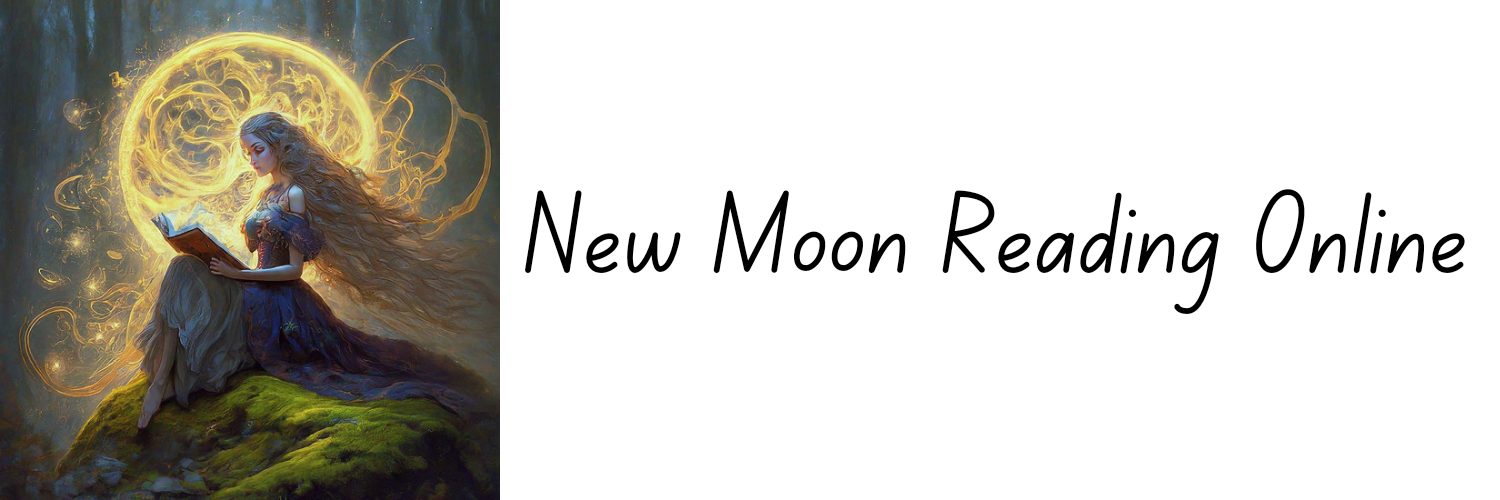
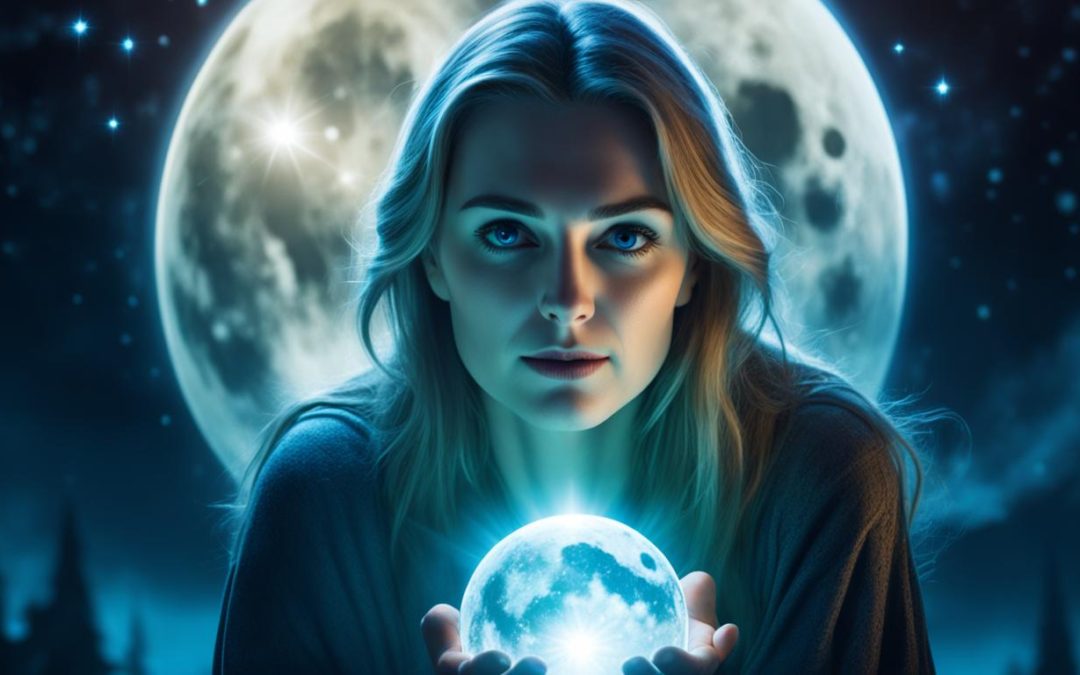
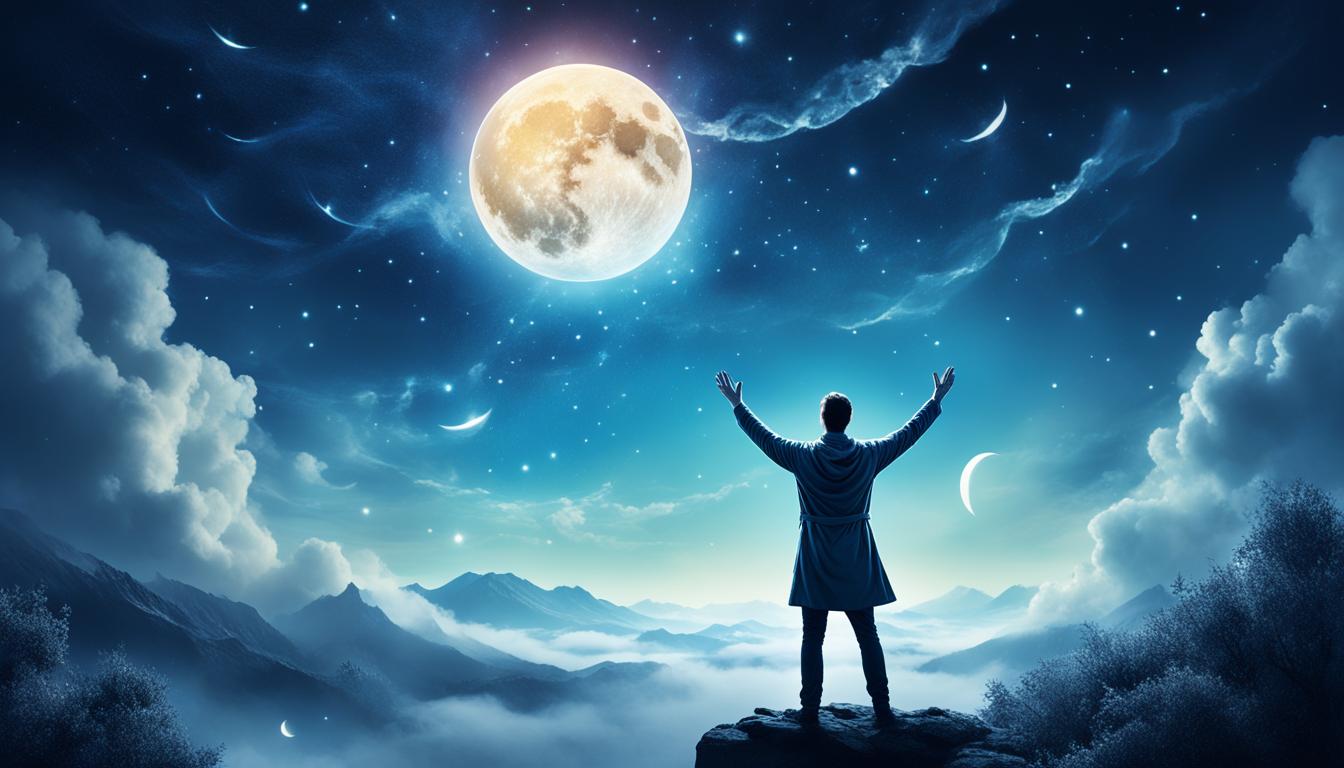


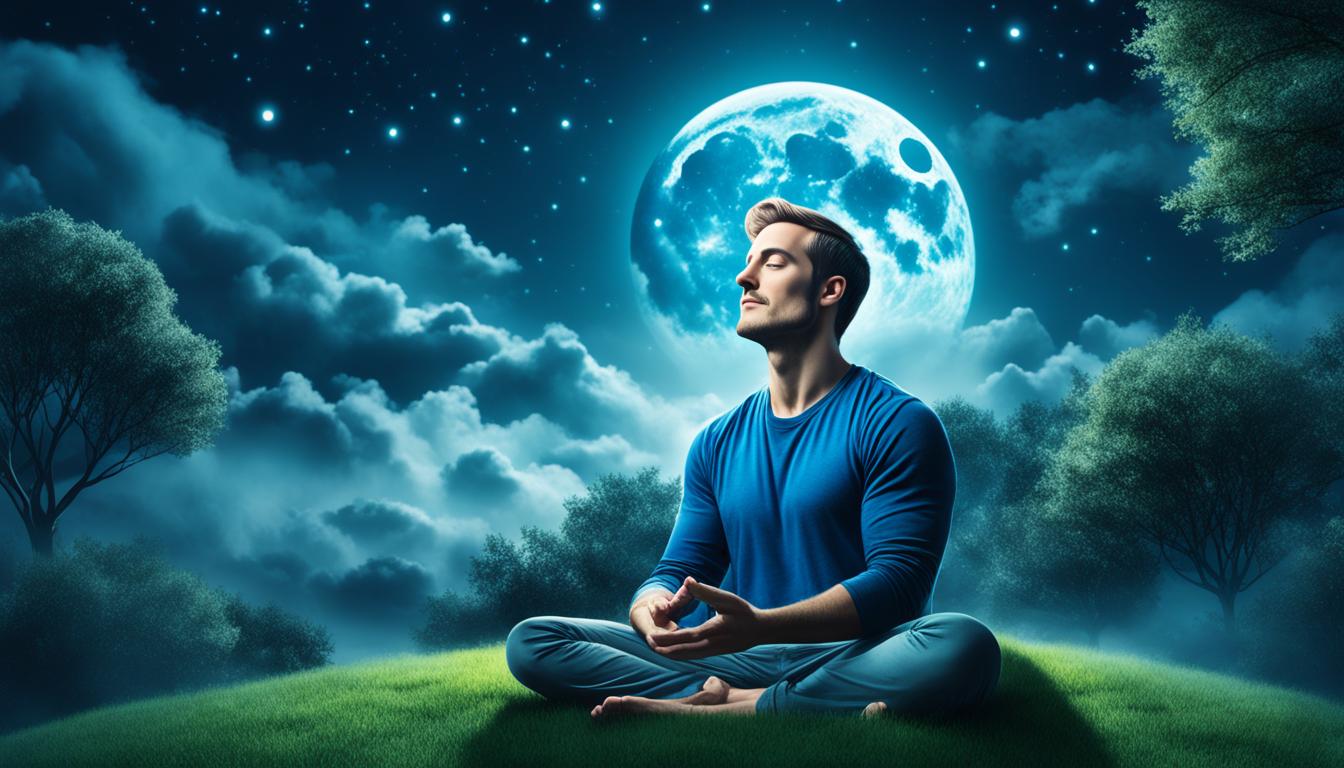

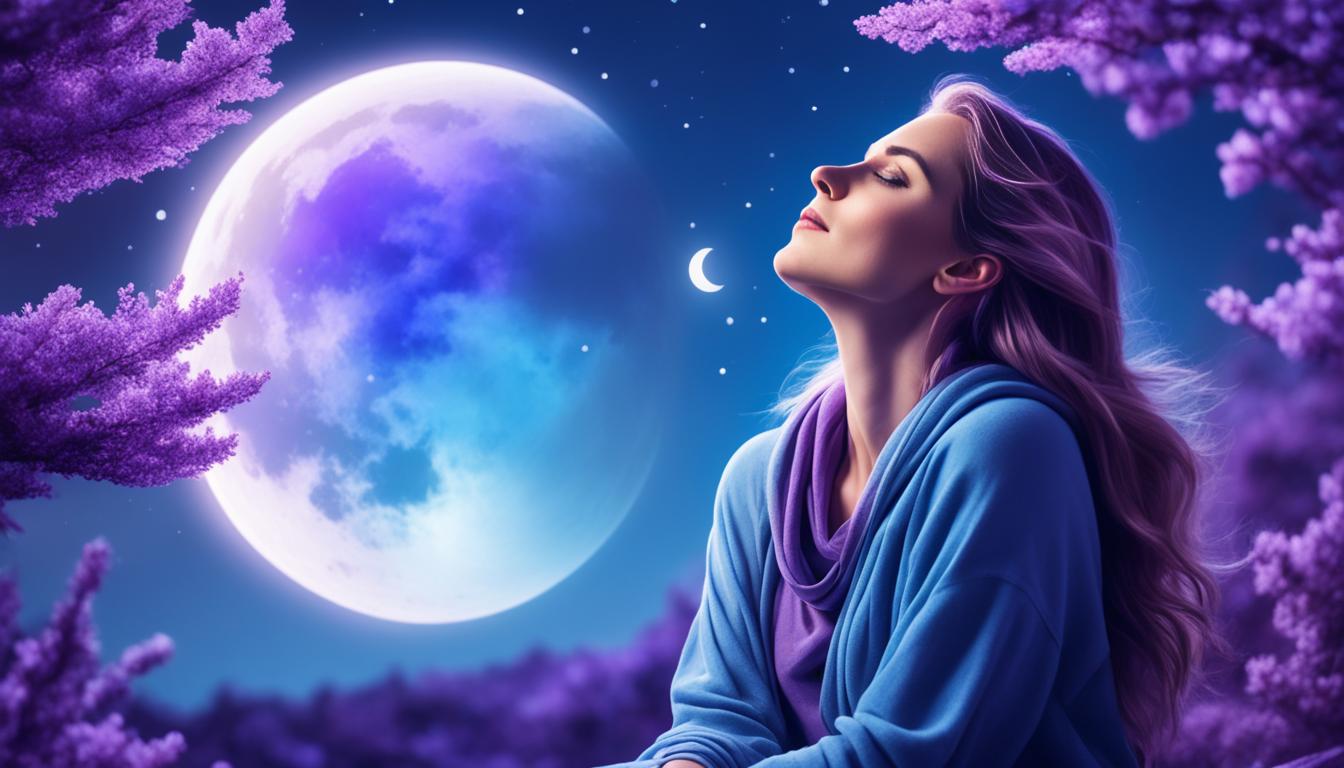


[…] journal can be incredibly helpful. Tracking energy levels throughout the different phases of the moon allows us to recognize…
[…] Reading is a new platform that offers personalized insights based on the lunar cycle1. It’s different from generic horoscopes,…
[…] As we set intentions aligned with the New Moon energy, we open ourselves to the power of manifestation. By…
[…] intentions during the new moon is a powerful practice that allows me to declare my goals and aspirations. It…
[…] These readings provide a convenient and accessible way to connect with the energies of the new moon and gain…